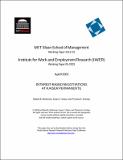| dc.contributor.author | MCKERSIE, ROBERT B. | |
| dc.contributor.author | EATON, SUSAN C. | |
| dc.contributor.author | KOCHAN, THOMAS A. | |
| dc.date.accessioned | 2003-06-27T18:39:14Z | |
| dc.date.available | 2003-06-27T18:39:14Z | |
| dc.date.issued | 2003-06-27T18:39:14Z | |
| dc.identifier.uri | http://hdl.handle.net/1721.1/3522 | |
| dc.description.abstract | In 1997 Kaiser Permanente (KP) and a coalition of 26 local unions representing nearly
70,000 Kaiser employees created what is now the nation's largest and most ambitious
labor-management partnership. In 2000, the parties faced the major challenge of
negotiating their first labor agreement under the new Partnership. They designed and
implemented what is also the largest and most complex interest-based negotiations
(IBN) process carried out to date in the field of labor-management relations. We
describe this case here, both to provide an historical account of the process and to
explore the lessons that might be learned from how these parties addressed a series of
generic challenges encountered when introducing IBN principles into collective
bargaining | en |
| dc.format.extent | 418954 bytes | |
| dc.format.mimetype | application/pdf | |
| dc.language.iso | en_US | |
| dc.relation.ispartofseries | MIT Sloan School of Management Working Paper;4312-03 | |
| dc.relation.ispartofseries | Institute for Work and Employment Research (IWER) Working Paper;05-2003 | |
| dc.subject | Labor-management Partnership | en |
| dc.subject | Interest-based Negotiations Process | en |
| dc.subject | Kaiser Permanente | en |
| dc.title | Interest-based Negotiations at Kaiser Permanente | en |
| dc.type | Working Paper | en |
